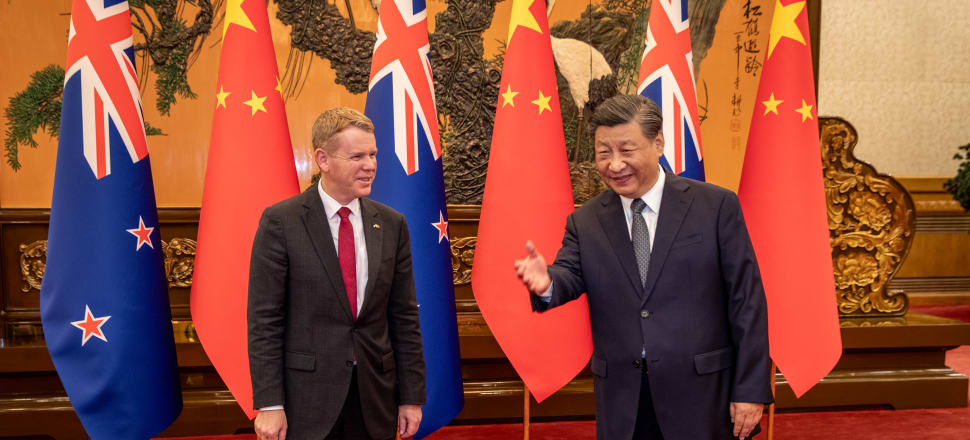
Nicholas Khoo examines three ways our relationship with China is creating new and formidable waves to navigate
Now that the dust has settled on Prime Minister Chris Hipkins’ meeting with Chinese leader Xi Jinping in Beijing, it is appropriate to step back for some reflection. Three points spring to mind.
First, the meeting highlights the reality of a mutual asymmetry on both sides of the China-New Zealand relationship.
The obvious asymmetry is that New Zealand exports more to China than it imports.
This has wider implications for our foreign policy. In recent years, the penny has finally dropped that foreign policy is much more than trade, and that trade dependence creates increased vulnerability. We are now more politically sensitive to this reality than during the Helen Clark and John Key administrations.
The asymmetry has a different cast for China, but is no less real. Because of a series of unforced foreign policy errors since 2012, China's relationships in the Indo-Pacific and further afield are increasingly strained.
Beijing now needs as many partners and friends as it can get. This simple yet powerful fact explains Xi's use of headline-grabbing “friend and partner” vocabulary with Hipkins. During a post-meeting briefing with the press, the Prime Minister responded to a question about whether he would echo the “friend and partner” characterisation with the comment that “Yes, by and large” he would.
Second, the Hipkins-Xi meeting highlights the reality that more so than at any point in the post-Cold War era, trade occurs in a strategic context.
And the strategic context is at once an increasingly fraught one for China, and a potentially positive game changer for New Zealand.
The formation of Aukus in 2021; the strengthening of the US' network of alliances and partnerships in the Indo-Pacific; the US' shift from a policy of ‘engagement’ (1972-2016) to 'strategic competition’ with China (since 2017); and the robust Nato response to Russian policy in Ukraine, all highlight the deterioration in China's strategic environment.
In contrast, Wellington's recent increased attention to the Anzac alliance; interactions with regional partners such as Japan and Fiji, and potential membership in Pillar II of Aukus adds heft to our foreign policy. This mitigates the risks created by the significant exposure created by China's role as New Zealand's largest trade partner. These are all part and parcel of our foreign policy ‘insurance policy'.
A third point concerns the question of how much relevance the New Zealand-China relationship has for China’s relationship with other states.
During his 40-minute meeting with Hipkins, Xi commented that “China-New Zealand relations have long been a pacemaker in China's relations with developed countries.”
In the Chinese leader’s view, “both countries should continue to see each other as partners rather than adversaries and opportunities rather than threats to consolidate the foundation for the growth of China-New Zealand relations".
These comments speak well for the prospects of developing the China-New Zealand relationship. But it is highly doubtful that they can be generalised.
There are simply too many unique aspects to the China-New Zealand relationship.
In terms of geography, our countries are far apart. This removes sources of friction – territorial disputes and cross-border interactions – that have frequently caused problems between other countries.
In terms of history, countries like China and New Zealand that have had less interaction simply have less opportunity, and thus have less of an imperative to construct hostile images of one another which disrupt contemporary relations.
So where does all of this leave New Zealand’s foreign policy in 2023? A myth has arisen that New Zealand is a trading state, with the unspoken implication that we are above the fray of great power politics. Much of that myth lies in former Prime Minister Robert Muldoon’s much-cited quote that "our foreign policy is trade. We are not interested in the normal foreign policy matters to any great extent, we are interested in trade."
That myth is debunked by the fact Muldoon’s quote wasn’t even true when it was uttered. During his tenure, New Zealand was a member of the Anzus alliance.
Muldoon was a shrewd politician and fully aware that trade occurs in a geopolitical context.
And the geopolitical context of 2023 differs markedly from the heyday of globalisation from 1991-2008, when the concept of an ‘international rules-based order' seemed unstoppable.
Welcome to New Zealand’s new reality, where great power politics has created some quite formidable waves for us to navigate.







